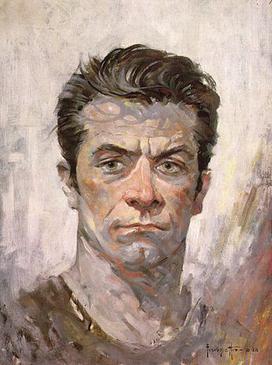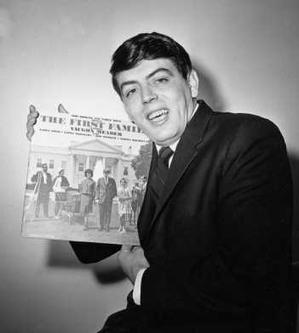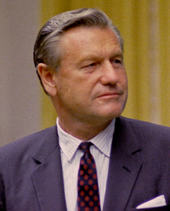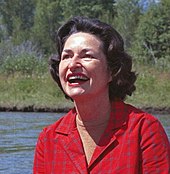
Lyndon Baines Johnson, also known as LBJ, was the 36th president of the United States, serving from 1963 to 1969. He became president after the assassination of John F. Kennedy, under whom he had served as the 37th vice president from 1961 to 1963. A Democrat from Texas, Johnson previously served as a U.S. representative and U.S. senator.

Ike & Tina Turner was an American musical duo consisting of husband and wife Ike Turner and Tina Turner. From 1960 to 1976, they performed live as the Ike & Tina Turner Revue, supported by Ike Turner's band, the Kings of Rhythm, and backing vocalists, the Ikettes. The Ike & Tina Turner Revue was regarded as "one of the most potent live acts on the R&B circuit."

Frank Frazetta was an American artist known for themes of fantasy and science fiction, noted for comic books, paperback book covers, paintings, posters, LP record album covers, and other media. He is often referred to as the "Godfather of fantasy art", and one of the most renowned illustrators of the 20th century. He was also the subject of a 2003 documentary Painting with Fire.

Paul Weston was an American pianist, arranger, composer, and conductor who worked in music and television from the 1930s to the 1970s, pioneering mood music and becoming known as "the Father of Mood Music". His compositions include popular music songs such as "I Should Care", "Day by Day", and "Shrimp Boats". He also wrote classical pieces, including "Crescent City Suite" and religious music, authoring several hymns and masses.

Abbott Vaughn Meader was an American comedian, impersonator, musician, and film actor.

Around the world, there were shocked reactions to the assassination of John F. Kennedy, the President of the United States, on Friday, November 22, 1963 in Dallas, Texas.

The Louvin Brothers were an American musical duo composed of brothers Ira and Charlie Louvin. The brothers are cousins to John D. Loudermilk, a Nashville Songwriters Hall of Fame member.

Sam Houston Johnson was an American businessman. He was the younger brother of President Lyndon B. Johnson.

The Lyndon Baines Johnson Library and Museum, also known as the LBJ Presidential Library, is the presidential library and museum of Lyndon Baines Johnson, the 36th president of the United States (1963–1969). It is located on the grounds of the University of Texas at Austin, and is one of 13 presidential libraries administered by the National Archives and Records Administration. The LBJ Library houses 45 million pages of historical documents, including the papers of President Johnson and those of his close associates and others.

"Hello, Dolly!" is the title song of the popular musical of the same name, with music and lyrics by Jerry Herman.

Lyndon B. Johnson National Historical Park is a United States National Historical Park in central Texas about 50 miles (80 km) west of Austin in the Texas Hill Country. The park protects the birthplace, home, ranch, and grave of Lyndon B. Johnson, 36th president of the United States. During Johnson's administration, the LBJ Ranch was known as the Texas White House because the President spent approximately 20% of his time in office there.

Samuel Ealy Johnson Jr. was an American businessman and politician. He was a six-term Democratic member of the Texas House of Representatives. He served in the 29th, 30th, 35th, 37th, and 38th Texas Legislatures. He was the father of Lyndon B. Johnson, the 36th president of the United States, and the son of Samuel Ealy Johnson Sr. He was a struggling farmer and cattle speculator who lived in the Texas Hill Country.
"Take My Hand, Precious Lord" is a gospel song. The lyrics were written by Thomas A. Dorsey, who also adapted the melody.

The First Family is a 1962 comedy album featuring comedian and impressionist Vaughn Meader. The album, written and produced by Bob Booker and Earle Doud, was recorded on October 22, 1962, is a good-natured parody of then-President John F. Kennedy, both as Commander-in-Chief and as a member of the prominent Kennedy family. Issued by Cadence Records, The First Family became the largest and fastest selling record in the history of the record industry, selling at more than one million copies per week for the first six and one-half weeks in distribution and remained at #1 on the Billboard 200 for 12 weeks. By January 1963, sales reached more than seven million copies. Cadence president Archie Bleyer credited the album's success to heavy radio airplay. The album was first played by Stan Z. Burns on WINS radio, a friend of Booker, and it instantly became a hit all over New York City. By the time the sequel album, The First Family Volume Two, was released, The First Family had sold 71⁄2 million copies – unprecedented for any album at the time, especially a comedy album.

Ollie Imogene "Jean" Shepard, was an American country singer who was considered by many writers and authors to be one of the genre's first significant female artists. Her early successes during the 1950s decade were said to influence the future careers of Loretta Lynn, Dolly Parton and Tammy Wynette.

Myrna Joy "Jody" Miller was an American singer, who had commercial success in the genres of country, folk and pop. She was the second female artist to win a country music accolade from the Grammy Awards, which came off the success of her 1965 song "Queen of the House". By blending multiple genres together, Miller's music was considered influential for other music artists.

"Help Me Make It Through the Night" is a country ballad written and composed by Kris Kristofferson and released on his 1970 album Kristofferson. It was covered later in 1970 by Sammi Smith, on the album Help Me Make It Through the Night. It has been covered since by many other artists from Tammy Wynette and Johnny Cash to Elvis Presley and Joan Baez and Bryan Ferry and Mark Eitzel.

How Great Thou Art is the eighth studio album by American singer and musician Elvis Presley, released by RCA Victor in February 1967. How Great Thou Art is a gospel album with slow numbers on one side, and fast-paced numbers on the flipside. The album earned Presley a Grammy Award for Best Sacred Performance, while it became a Billboard top 20 pop hit and it appeared on the Top Country Albums chart on the top 10.

The desk in the Vice President's Room of the United States Capitol, colloquially known as the Wilson desk and previously called the McKinley-Barkley desk, is a large mahogany partner's desk used by U.S. Presidents Richard Nixon and Gerald Ford in the Oval Office as their Oval Office desk. One of only six desks used by a President in the Oval Office, it was purchased in 1898 by Garret Augustus Hobart, the 24th Vice President of the United States, for the Vice President's Room in the United States Capitol.

Bob Booker was an American writer and producer of television shows and record albums. He is best known for producing the 1962 album The First Family with Earle Doud. The album is a parody of President John F. Kennedy and his family, and it both remained at #1 on the Billboard 200 for 12 weeks and won a Grammy for Best Album of the Year in 1963.





















